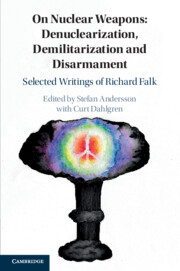 On Nuclear Weapons: Denuclearization, Demilitarization and Disarmament
On Nuclear Weapons: Denuclearization, Demilitarization and Disarmament Book contents
- On Nuclear Weapons: Essays by Richard Falk on Denuclearization, Demilitarization, and Disarmament
- On Nuclear Weapons: Essays by Richard Falk on Denuclearization, Demilitarization, and Disarmament
- Copyright page
- Dedication
- Epigraph
- Contents
- Foreword by Zia Mian
- Preface by Richard Falk
- Acknowledgments
- Part I International Law and World Order
- Contents
- 1 The Shimoda Case
- 2 Nuclear Policy and World Order
- 3 Toward a Legal Regime for Nuclear Weapons
- 4 Nuclear Weapons, International Law, and the World Court
- 5 The Nuclear Weapons Advisory Opinion and the New Jurisprudence of Global Civil Society
- 6 Inhibiting Reliance on Biological Weaponry
- Part II Impacts of Democracy, Neutrality, and National Interest
- Part III Nuclear Policy Initiatives
- Part IV Remembering the Past, Encountering the Future
- Index
5 - The Nuclear Weapons Advisory Opinion and the New Jurisprudence of Global Civil Society
from Part I - International Law and World Order
Published online by Cambridge University Press: 04 July 2019
- On Nuclear Weapons: Essays by Richard Falk on Denuclearization, Demilitarization, and Disarmament
- On Nuclear Weapons: Essays by Richard Falk on Denuclearization, Demilitarization, and Disarmament
- Copyright page
- Dedication
- Epigraph
- Contents
- Foreword by Zia Mian
- Preface by Richard Falk
- Acknowledgments
- Part I International Law and World Order
- Contents
- 1 The Shimoda Case
- 2 Nuclear Policy and World Order
- 3 Toward a Legal Regime for Nuclear Weapons
- 4 Nuclear Weapons, International Law, and the World Court
- 5 The Nuclear Weapons Advisory Opinion and the New Jurisprudence of Global Civil Society
- 6 Inhibiting Reliance on Biological Weaponry
- Part II Impacts of Democracy, Neutrality, and National Interest
- Part III Nuclear Policy Initiatives
- Part IV Remembering the Past, Encountering the Future
- Index
Summary
Despite the notable attention given by international law scholars to the normative status of trends toward democratization in state/society relations, remarkably little notice has been paid to the jurisprudential significance of the emergence of transnational democratic tendencies as a feature of the international legal order at the end of the twentieth century. In a manner that appears ethnocentric and lacking in normative authority, liberal North American scholars have been, in effect, proclaiming the universal applicability of the US political and legal system, and its commitment to constitutionalism, electoral politics, and civil and political rights.
Deeper questions exist about the interplay between democratic politics, as expressed through electoral processes and representative institutions, and world order in the setting of a deformed or regressive political culture. Consider in this regard the East European countries; the Israeli election in 1996 of a hardline Likud leader as president, dooming the peace process in the Middle East; the support among the US electorate for military initiatives in foreign policy; the refusal of the US Congress to approve plans for the repayment of arrears in financial obligations to the United Nations; and the apparent reluctance to support a world order bargain on the reduction of greenhouse gas emissions as negotiated in 1997 in Kyoto.
- Type
- Chapter
- Information
- On Nuclear Weapons: Denuclearization, Demilitarization and DisarmamentSelected Writings of Richard Falk, pp. 102 - 120Publisher: Cambridge University PressPrint publication year: 2019


